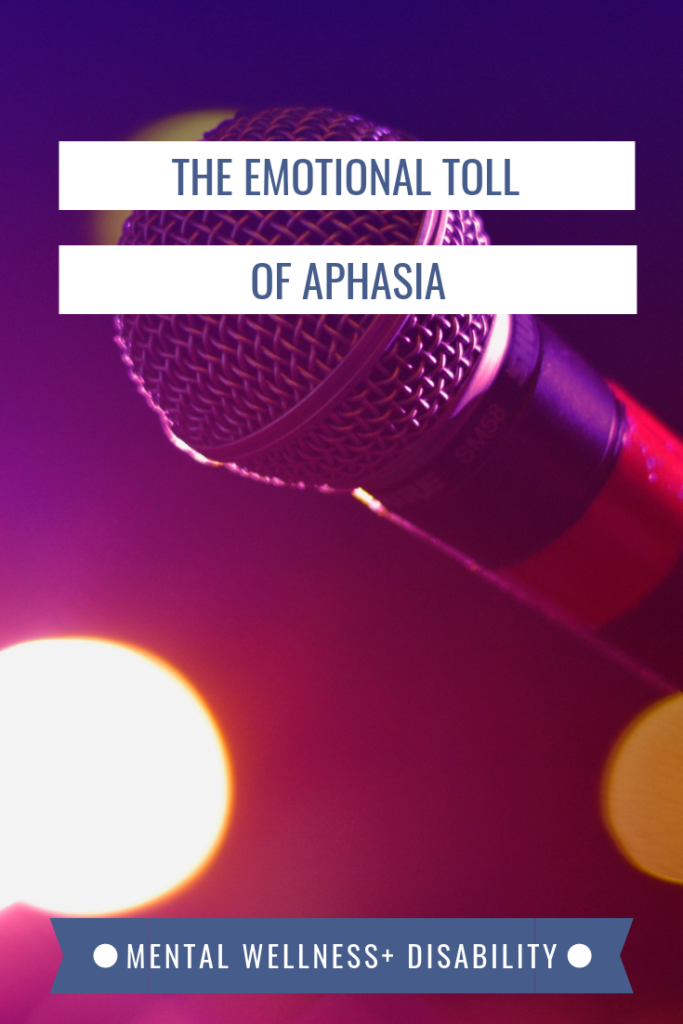Imagine if the last thing you said was the last thing you EVER said.
Imagine having all of your knowledge and thought processes intact but being unable to express yourself because you can’t find the words.
If you can imagine that this would strain your relationships and make you prone to depression and isolation, you’d be absolutely right.
People who have aphasia don’t have to imagine these things. For them, it is their daily reality.
Aphasia is more common than cerebral palsy or Parkinson’s disease, yet few people have ever heard of it. Nearly 2 million people in the United States have aphasia, and close to 200,000 new cases occur every year.
Aphasia most commonly occurs in older adults following stroke, however, aphasia can truly affect any one of us at any time in our lives.
Many North Carolinians were reminded of this in 2016, when the voice of the Tarheels, renowned sports radio broadcaster Woody Durham, announced that he had aphasia. If you’re completely unfamiliar with aphasia, you can find out more information here. 
My connection to Aphasia
I have always supported people with acquired disabilities like Aphasia in individual counseling. I’m now delighted to be serving the Triangle Aphasia Project (TAP Unlimited) by offering monthly support groups in their Cary, NC office. One group is for clients with aphasia, and the other is for caregivers. If you want more information about those groups, please contact TAP.
I sat down with TAP’s Executive Director Maura Silverman, MS, CCC/SLP, to chat a bit about the emotional toll of Aphasia. In addition to being a powerhouse of knowledge and advocacy, Maura has a unique connection to aphasia. Maura’s mother experienced a stroke a number of years ago, and developed aphasia as a result. Maura describes how her view of her mother’s aphasia has changed over time:
“I used to refer to my mother’s stroke and resulting aphasia as “the great cosmic irony” or with expressions steeped with terms like “unfair”, “punishment”, etc… but I’ve realized that her aphasia has been another completely selfless, undeniably generous gift to me and my work. It is consistent with her nature to give even at her most vulnerable and pained state. My mother having aphasia taught me things that I could never have learned in a classroom or a lab. She has taught me how to teach others, to support and give with the proper perspective.”
I asked Maura three questions about Aphasia, and her responses demonstrate the depth of that perspective.
What do you wish that everyone knew about aphasia?
“I wish that everyone knew that aphasia masks a person’s cognitive competency, but that the use of even simple communication tools can reveal it. An individual with aphasia does not have an intellectual or memory impairment, rather a disorder of accessing the language needed to communicate his/her thoughts, feelings and ideas.”
If you could say one thing to a person who has just been diagnosed with aphasia, what would you want them to know?
“I would want them to feel, and to KNOW, that there is so much hope. What we know now about neuroplasticity opens a new world of potential for recovery. It’s something you must believe and set your mind to achieving. And that therapy is not life … life is therapy. Communicative opportunities in real life activities and pursuits is the best therapy you can get!”
What’s the best advice that you have for caregivers who have a loved one with aphasia?
“As a caregiver myself, I know that the advice you get is to “take care of yourself, or you won’t be any good to the person, etc”, but it’s not that easy. Communication is a two way street and the loss your loved one feels can happen to you as well…you may miss late night reflections on day, or deep discussions about politics. Find others who can listen and truly emphasize. Connection is not just for the individual with aphasia…it can be a life line for YOU!”
Aphasia is something that counselors need advice on too
From what clients have told me about their experiences with counselors, I’ve realized that many counselors aren’t familiar with aphasia. Like people with Down syndrome, I believe that people with aphasia represent a hugely under-served population when it comes to mental health counseling. If you’re a therapist counseling a client with aphasia, here are a few things to consider.
Have an accessibility script
I recommend that you run through an ‘accessibility script’ with all new clients, but definitely do this with new clients with aphasia. Because many people develop aphasia secondary to a stroke, it’s important to ensure that physical access to your space is possible. Do a quick review of your office and note anything that is not fully accessible to someone who uses a walker or wheelchair, or who doesn’t have full use of both hands (especially the right hand). You can use my overview of how I designed my therapy space as a general guide. You could also hire an Occupational Therapist (OT) to come in and do a review of your space. Prepare a short script, like:
“My office is on the second floor and is accessible only by climbing a flight of 12 stairs. There is a handrail on the right side. The bathroom is located in the waiting room, about 10 feet outside of my office. Will that be OK for you, or is there anything I can offer as an accommodation?”
Sometimes people will say that no, stairs are a deal breaker for them, and they’ll need to move on to another therapist. If this is the case, I urge you not to feel guilty. Yes, it stinks that you can’t make it work to see this client. But being upfront about the limitations of your office’s accessibility is so, so preferable to having a client go through the hard work of finding a therapist they feel they can connect with, only to arrive and realize they can’t actually get into the office to see you. If you let them know that you’ll try to offer accommodations, they just might take you up on it. Sometimes they might ask you to meet them downstairs to help them walk up the stairs, or to carry their bag, or whatever. Of course, you could always offer to meet them in-home if that feels like a solution!
Have a few tools at the ready
Sometimes people with aphasia can’t say the word they’re looking for, but they can write it. Have a notepad and a chunky marker available in case they’d like to try this. Here are mine: It’s kind of like tissues. I never push them on someone, but I will place them so that it’s clear they’re there if they’ll make the client more comfortable to use. If a client had a stroke that affected their left hemisphere, they are likely to experience loss of functionality in their right arm. I’d place the notepad and marker on a side table to their left.
Understand the complementary but different roles of the counselor and the SLP
Speech Language Pathologists (SLP’s) receive training on some basic counseling tools as part of their graduate course of study. However, around 82% of them feel that they need further training and more experience in counseling. Take a cue from them and recognize the complementary but different roles that you each play. Remember, you don’t have to be focused on promoting the client’s speech. This can feel strange, especially when collaborating closely with the speech team. This is where it’s critical to consider your client holistically. Focusing exclusively on speech rehabilitation may prevent fully and authentically connecting with your client’s emotional experience. Full sentences and proper pronouns are fine and all. But if I’m trying to connect with a person who’s struggling to get the words out, I’m not going to get caught up in every detail. Of course, this takes some finesse (see next point).
Know when and how it’s important to clarify, and when it doesn’t matter so much
When the details do matter, I like to double up on clarification. At points when you confirm understanding the client’s viewpoint, find a way to do so twice. The client may realize that they have confused a key piece of information the second time they’re asked to give their support for the statement. Take for example a client discussing that her relationship with her daughter has been difficult since her stroke.
“So, one thing that’s been really hard since the stroke has been finding ways to connect with your daughter, is that right?”
And the client will nod and say yes. And then I’ll say:
“Ok, I see. A big part of what’s been difficult has been how your relationship with your daughter has gotten worse.”
It may turn out that when it’s said a second time the client realizes that a key piece of info was incorrect. Maybe she was actually talking about her mother, not her daughter. Don’t attempt advanced empathy until you’ve double confirmed just the facts (for really important topics, at least)!
Suggest additional resources that may be of benefit to your client (and their family members)
Many clients who need around the clock care after a stroke worry that they are a burden on their families. This contributes to their depression and feeling that they lack control in their lives. Many family members, while they are grateful that their loved one is recovering, will acknowledge that providing that level of care is truly exhausting. I often suggest that these families consider whether hiring a personal care aide might provide everyone with some relief. Here are my best tips on finding a great personal care aide.
Communicate that you understand your client’s frustration, but that their speech isn’t frustrating to you
Let your client know that you see their struggle. But be sure to also let them know that you don’t expect them to say more than what they can. Show them that you aren’t impatient, or wishing they were anything other than what they are. “‘I understand that when you can’t get the words out the way you want to, it’s frustrating for you. But I want you know that it isn’t frustrating for me. I don’t need you to hurry up or get it right for my sake. We’ll take as long as we need to, and we’ll circle back if we have to. Even if you’re not happy with what you’re saying and how you’re saying it, I’m happy to listen. Because you’re enough, even now, when you feel most broken.” You will surely find, as I have, that simply holding space and showing patience and kindness to someone with aphasia can do tremendous good. This is the foundation upon which their emotional healing can begin. If you’d like to learn more about aphasia and stroke recovery from a personal perspective, here are a few of my favorite books. Or, if you prefer to get more active, you can sign up to for the Strides for Speech 5k and 1/2 mile event on October 6, 2018 in Morrisville, NC. This race support’s TAP’s ongoing programming for clients with Aphasia. Be sure to look for me on race day, I’ll be there!









